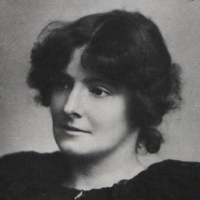The Dead to the Living
Work while it is day: the night cometh, when no man can work.
IN the childhood of April, while purple woods
With the young year’s blood in them smiled,
I passed through the lanes and the wakened fields,
And stood by the grave of the child.
And the pain awoke that is never dead
Though it sometimes sleeps, and again
It set its teeth in this heart of mine,
And fastened its claws in my brain:
For it seemed so hard that the little hands
And the little well-loved head
Should be out of reach of my living lips,
And be side by side with the dead—
Not side by side with us who had loved,
But with these who had never seen
The grace of the smile, the gold of the hair,
And the eyes of my baby-queen.
Yet with trees about where the brown birds build,
And with long green grass above,
She lies in the cold sweet breast of earth
Beyond the reach of our love;
Whatever befalls in the coarse loud world,
We know she will never wake.
When I thought of the sorrow she might have known,
I was almost glad for her sake. . . .
Tears might have tired those kiss-closed eyes,
Grief hardened the mouth I kissed;
I was almost glad that my dear was dead
Because of the pain she had missed.
Oh, if I could but have died a child
With a white child-soul like hers,
As pure as the wind-flowers down in the copse,
Where the soul of the spring’s self stirs;
Or if I had only done with it all,
And might lie by her side unmoved!
I envied the very clods of earth
Their place near the child I loved!
And my soul rose up in revolt at life,
As I stood dry-eyed by her grave,
When sudden the grass of the churchyard sod
Rolled back like a green smooth wave;
The brown earth looked like the brown sea rocks,
The tombstones were white like spray,
And white like surf were the curling folds
Of the shrouds where the dead men lay;
For each in his place with his quiet face
I saw the dead lie low,
Who had worked and suffered and found life sad,
So many sad years ago.
Unchanged by time I saw them lie
As when first they were laid to rest,
The tired eyes closed, the sad lips still,
And the work-worn hands on the breast.
There were some who had found the green world so grey,
They had left it before their time,
And some were little ones like my dear,
And some had died in their prime;
And some were old, they had had their fill
Of bitter unfruitful hours,
And knew that none of them, none, had known
A flower of a hope like ours!
Through their shut eyelids the dead looked up,
And without a voice they said:
‘We lived without hope, without hope we died,
And hopeless we lie here dead;
And death is better than life that draws
Pain in, as it draws in breath,
If life never dreams of a coming day
When life shall not envy death.
Through the dark of our hours and our times we lived,
Uncheered by a single ray
Of such hope as lightens the lives of you
Who are finding life hard to-day;
With our little lanterns of human love
We lighted our dark warm night—
But you in the chill of the dawn are set
With your face to the eastern light.
Freedom is waiting with hands held out
Till you tear the veil from her face—
And when once men have seen the light of her eyes,
And felt her divine embrace,
The light of the world will be risen indeed,
And will shine in the eyes of men,
And those who come after will find life fair,
And their lives worth living then!
Will you strive to the light in your loud rough world,
That these things may come to pass,
Or lie in the shadow beside the child,
And strive to the sun through the grass?’
‘My world while I may,’ I cried; ‘but you
Whose lives were as dark as your grave?’
‘We too are a part of the coming light,’
They called through the smooth green wave.
Their white shrouds gleamed as the flood of green
Rolled over and hid them from me—
Hid all but the little hands and the hair,
And the face that I always see.

